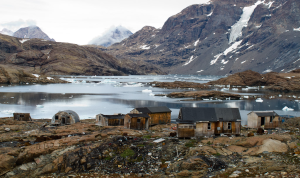If you’re at all disgusted by bodily fluids, don’t even think about reading this book. If you’re not, prepare yourself for a firework of a novel by a master storyteller set in a part of the world which I’m willing to bet you’ve never read anything about before. Kim Leine’s novel The Prophets of Eternal Fjord, set in Greenland during Danish colonial rule, won the Nordic Council Literature Prize in 2013 and is finally out in English.
It’s 1782 and innocent, small town boy Morten Falck, moves from Norway to Copenhagen to study theology. His meeting with the big city and all its temptations changes him forever. Five years on, Morten boards a ship bound for Greenland, then a colony of Denmark, to fill the post of priest and Christian missionary at Sukkertoppen, their largest settlement. Hungry for adventure, full of hope, inspired by the ideas of Enlightenment and utterly clueless, Morten sets off, in the company of his cow, on a perilous sea crossing which in itself is worth the read.
Fast-forward another five years. Morten is a toothless, broken, disillusioned man restlessly awaiting the arrival of the ship that will take him back to Denmark. Just like his cow, Morten is finished. Something terrible has happened. But what?
Be prepared for a culture clash of gigantic proportions. Of prejudices, racism, double standards, sexual and physical abuse, and betrayals. Of conversion of the native heathens to Christianity, gun in hand. And a roster of vividly portrayed characters such as Kragsted, the abusive, totalitarian head of the Danish trading company who controls everything and everyone at Sukkertoppen; Oxbøl, a lecherous pastor whose fair-skinned, mixed race illegitimate children are spread all over Greenland. And Maria Magdalena and her husband Habakuk, also known as the prophets of Eternal fjord, a charismatic native couple running a ‘competing’ settlement with their own take on Christianity.
Caught up in the middle of all this is Morten who despite his noble intentions has an uncanny ability to turn anything he touches into stone and whose moral principles seem easily eroded.
Just like the landscape and climate he describes, Kim Leine is a raw, almost brutal, writer. There are times in this book when you want to look the other way or even gag, such is the vividness of his descriptions. Smells and bodily fluids are everywhere: seal blubber, sweat, urine.
He seats himself on the strangers’ bench and pulls off his coat, though still he is too warmly dressed. The long room is dark, thick with the stench of filled urine tubs, human odours, sizzling oil lamps, flesh boiling in dented post over the fire. He knows these houses; he has become used to the smells and the nakedness, the sound of squelching breasts and hands slapping at lice.
It’s not only the smells that tear at the reader of this book. The characters are equally disquieting: noble one minute, evil the next. Even our protagonist Morten is less than likeable at times. Is it all down to the dreadful situation he’s in? Or is he simply a brute at heart? Or more likely, a bit of both. In fact, rarely have I read a book where there are so few sympathetic characters. Did it matter? Not a bit.
Leine’s book is a scorching attack on colonialism, missionary work and religion as a smoke screen. He’s a terrific storyteller who grabs your attention from the very first page. There were times I felt his editor could have been more heavy-handed and the story wanders off a bit towards the end, but all in all a riveting and very different read.
The Prophets of Eternal Fjord by Kim Leine is published by Atlantic, translated by Martin Aitken, 576 pages.






